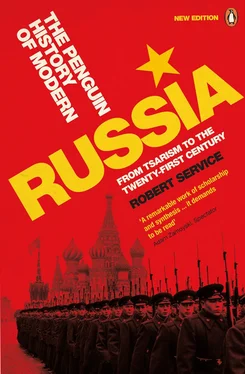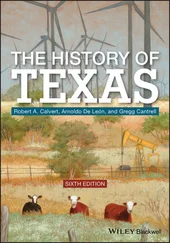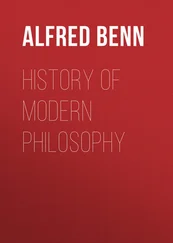The peasantry had not been much slower to move against the authorities than the workers: most rural districts in European Russia were categorized as ‘disorderly’ in summer 1905. 18Illegal sawing of timber and pasturing of livestock on landlords’ land took place. Threats were made on gentry who lived in the countryside. Often a cockerel with its neck slit would be laid on the doorstep of their houses to warn them to get out of the locality. The Russian peasant households organized their activities within their communes — and frequently it was the better-off households which took the leading role in the expression of the peasantry’s demands. In 1905–6 the countryside across the empire was in revolt. Only the fact that Nicholas II could continue to rely upon a large number of the regiments which had not been sent to the Far East saved him his throne. It was a very close-run thing.
And so the First State Duma met in April 1906. The largest group of deputies within it was constituted by peasants belonging to no party. Contrary to Nicholas II’s expectation, however, these same deputies stoutly demanded the transfer of the land from the gentry. He reacted by dissolving the Duma. The party with the greatest number of places in the Duma was the Constitutional-Democratic Party and its leaders were so angered by the Duma’s dispersal that they decamped to the Finnish town of Vyborg and called upon their fellow subjects to withhold taxes and conscripts until a fuller parliamentary order was established. Nicholas faced them down and held a further set of elections. To his annoyance, the Second Duma, too, which assembled in March 1907, turned out to be a radical assembly. Consequently Nicholas turned to his Minister of Internal Affairs, Pëtr Stolypin, to form a government and to rewrite the electoral rules so as to produce a Third Duma which would increase the importance of the gentry at the expense of the peasantry.
Stolypin was a reforming conservative. He saw the necessity of agrarian reform, and perceived the peasant land commune as the cardinal obstacle to the economy’s efficiency and society’s stability. He therefore resolved to dissolve the commune by encouraging ‘strong and sober’ peasant households to set themselves up as independent farming families. When the Second Duma had opposed him for his failure to grant the land itself to the peasantry, Stolypin had used the emergency powers of Article 87 of the Basic Law to push through his measures. When Russian peasants subsequently showed themselves deeply attached to their communes, he used a degree of compulsion to get his way. Nevertheless his success was very limited. By 1916 only a tenth of the households in the European parts of the empire had broken away from the commune to set up consolidated farms — and such farms in an area of great fertility such as west-bank Ukraine were on average only fifteen acres each. 19
It was also recognized by Stolypin that the Imperial government would work better if co-operation were forthcoming from the Duma. To this end he sought agreements with Alexander Guchkov and the so-called Octobrist Party (which, unlike the Kadets, had welcomed the October Manifesto). Guchkov’s Octobrists were monarchist conservatives who thought roughly along the same lines as Stolypin, but insisted that all legislation should be vetted by the Duma. 20At the same time Stolypin wanted to strengthen a popular sense of civic responsibility; he therefore persuaded the Emperor to increase the peasantry’s weight in the elections to the zemstva. Peasants, he argued, had to have a stake in public life. The political, social and cultural integration of society was vital and Stolypin became convinced that Russian nationalists were right in arguing that Russia should be treated as the heartland of the tsarist empire. Further curtailments were made on the already narrow autonomy of Poles, Finns and other nations of the Russian Empire; and Stolypin strengthened the existing emphasis on Russian-language schooling and administration.
At court, however, he was regarded as a self-interested politician bent upon undermining the powers of the Emperor. Eventually Nicholas, too, saw things in this light, and he steadily withdrew his favour from Stolypin. In September 1911, Stolypin was assassinated by the Socialist-Revolutionary Dmitri Bogrov in Kiev. There were rumours that the Okhrana , the political police of the Ministry for the Interior, had facilitated Bogrov’s proximity to the premier — and even that the Emperor may have connived in this. Whatever the truth of the matter, the Emperor resumed policies involving the minimum of co-operation with the State Duma. Intelligent conservatism passed away with the death of Pëtr Stolypin.
Yet it was no longer possible for tsarism to rule the country in quite the old fashion. In the eighteenth century it had been exclusively the nobility which had knowledge of general political affairs. The possession of this knowledge served to distance the upper classes from the rest of society. At home the families of the aristocracy took to speaking French among themselves; they imbibed European learning and adopted European tastes. A line of exceptional noble-men — from Alexander Radishchev in the 1780s through to an anti-tsarist conspiracy known as the Decembrists in 1825 — questioned the whole basis of the old regime’s legitimacy. But vigorous suppression did not eliminate the problem of dissent. Some of the greatest exponents of Russian literature and intellectual thought — including Alexander Herzen, Nikolai Chernyshevski, Ivan Turgenev and Lev Tolstoy — made it their life’s work to call for a drastic change in conditions.
Permanent opposition had taken organized form from the 1860s despite the prohibition on the formation of political parties, on the holding of political meetings and on public demands for political freedom. Most of the rebels were believers in agrarian socialism. Called the narodniki (or populists), they argued that the egalitarian and collectivist spirit of the peasant land commune should be applied to the whole society. At first they had gathered in little secret circles. But by 1876 they had founded a substantial party, Land and Freedom, which conducted propaganda among intellectuals and workers as well as among peasants, and also carried out acts of terror upon officials. When Land and Freedom fell apart, a group of terrorists calling themselves People’s Will was formed. It succeeded in assassinating Emperor Alexander II in 1881. Political repression was intensified; but as quickly as one group might be arrested another would be formed. Not only narodniki but also Marxists and liberals founded tenacious organizations in the 1890s.
The culture of opposition was not confined to the revolutionary activists. In the nineteenth century there was a remarkable expansion of education: secondary schools and universities proliferated and students were remarkably antagonistic to the regime. The methods of instruction and discipline grated upon young people. Nor did their unease disappear in adulthood. The tsarist order was regarded by them as a humiliating peculiarity that Russia should quickly remove.
Their feelings were strengthened by journalists and creative writers who informed public opinion with a freedom that increased after 1905. 21Previously, most legal newspapers had been conservative or very cautiously liberal; afterwards they spanned a range of thought from proto-fascist on the far right to Bolshevik on the far left. Although the Okhrana closed publications that openly advocated sedition, the excitement of opinion against the authorities was constant. Not only newspapers but also trade unions, sickness-insurance groups and even Sunday schools were instruments of agitation. The regime stipulated that trade unions should be locally based and that their leaderships should be drawn from the working class. But this served to give workers an experience of collective self-organization. By thrusting people on to their own resources, tsarism built up the antidote to itself. The rationale of the old monarchy was further undermined.
Читать дальше












